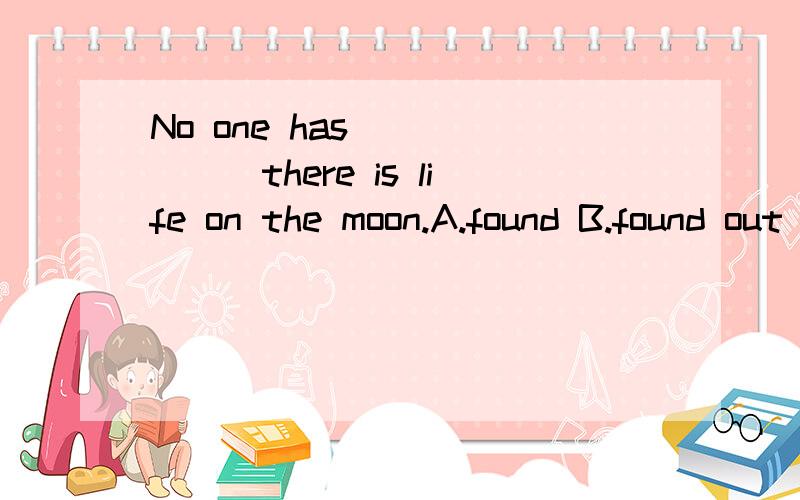No one has ______there is life on the moon.A.found B.found out C.discovered D.looked for应选哪个,
来源:学生作业帮助网 编辑:作业帮 时间:2024/07/18 03:26:37

No one has ______there is life on the moon.A.found B.found out C.discovered D.looked for应选哪个,
No one has ______there is life on the moon.A.found B.found out C.discovered D.looked for
应选哪个,
No one has ______there is life on the moon.A.found B.found out C.discovered D.looked for应选哪个,
◆look for 意为“寻找”,强调找的动作,是延续性动词.
eg:I’m looking for my pen.
◆find 意为“找到、发现、感到”,强调找的结果,是非延续性动词.
eg:He can’t find his watch.
eg:I find it difficult to learn English well.
◆find out 意为“查明、发现、了解”,指经过认真观察、调查或研究把某事、某物查出来、搞清楚,多用于复杂而不容易直接查出的情况.
eg:Please find out the answer to the question.
eg:Do you find out why Tom was late?
◆discover 意为“发现、发觉”,指发现某种情况或发现早已存在而未为人知的东西.
eg:Scientists around the world are working to discover a cure for AIDS.
综上所述,选C.没有人发现过月球上存在生命.
C
◆look for 意为“寻找”,强调找的动作,是延续性动词。
eg: I’m looking for my pen.
◆find 意为“找到、发现、感到”,强调找的结果,是非延续性动词。
eg:He can’t find his watch.
eg:I find it difficult to learn English well.
◆find out 意...
全部展开
◆look for 意为“寻找”,强调找的动作,是延续性动词。
eg: I’m looking for my pen.
◆find 意为“找到、发现、感到”,强调找的结果,是非延续性动词。
eg:He can’t find his watch.
eg:I find it difficult to learn English well.
◆find out 意为“查明、发现、了解”,指经过认真观察、调查或研究把某事、某物查出来、搞清楚,多用于复杂而不容易直接查出的情况。
eg:Please find out the answer to the question.
eg:Do you find out why Tom was late?
◆discover 意为“发现、发觉”,指发现某种情况或发现早已存在而未为人知的东西。
eg:Scientists around the world are working to discover a cure for AIDS.
选D,月球上的生命迹象是未为人知的。
收起
C.discovered